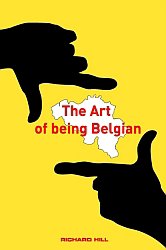 I am still a little bit interested in what happens in the old country, despite having left more than 15 years ago, vowing never to return to live there. Viewed from abroad Belgium is at best baffling but usually completely incomprehensible if you have never lived there for a longer period of time. English journalist Richard Hill wrote a book about it: "The Art of Being Belgian". You miss out on the long regional histories, the fierce parochialism, the national political ideology of compromising but never giving up searching for new ways to quarrel or create political mischief: from collaborating with the Nazis during World War II to uniting unlikely political bedfellows in order to keep fascists out of power.
I am still a little bit interested in what happens in the old country, despite having left more than 15 years ago, vowing never to return to live there. Viewed from abroad Belgium is at best baffling but usually completely incomprehensible if you have never lived there for a longer period of time. English journalist Richard Hill wrote a book about it: "The Art of Being Belgian". You miss out on the long regional histories, the fierce parochialism, the national political ideology of compromising but never giving up searching for new ways to quarrel or create political mischief: from collaborating with the Nazis during World War II to uniting unlikely political bedfellows in order to keep fascists out of power.I won't explain here the strange beast that is Belgium, if you want a flavour of that, check the Wikipedia entries for Belgium (there'll be a test afterwards!).
Now comes the news (in Flemish only) of an informal think tank, called "De Warande", which is thinking aloud about the future of country now in its 175th year and still digesting two state reforms that resulted in a "federal kingdom". It is suggesting to go the whole hog and split the country into various new sovereign states, like Czechoslovakia did a few years ago. In the European Union it should be perfectly possible for countries to split up amicably with the new bits still remaining within the EU. It would be a way for smaller communities to get a say at the main table and no longer be ignored by "Brussels" because their current parent state decides in their place. I'm sure the Basqs, Catalans, Bretons, Bavarians and Scots, among many others, would be better served by independence.
In Belgium's case the lack of progress on this front is due to, again, historical, cultural linguistic and economic reasons, as De Warande notes:
- the current federal system is incomplete regards delineation of competencies of the various federal and regional entities
- the national debt still needs to be paid nationally or split up (something Czechoslovakia hasn't managed to solve either)
- economic and monetary transfers between regions precent poorer regions from reforming its economy to catch up
- Brussels is a perennial stumbling bloc due to its geography (a French speaking city surrounded by Flanders)
- dividing Belgium along linguistic borders means they will become international borders and need consent from the population affected on all sides.
So in all plenty of discussion, quarrels, tantrums and compromises ahead. Not much change there then.
No comments:
Post a Comment